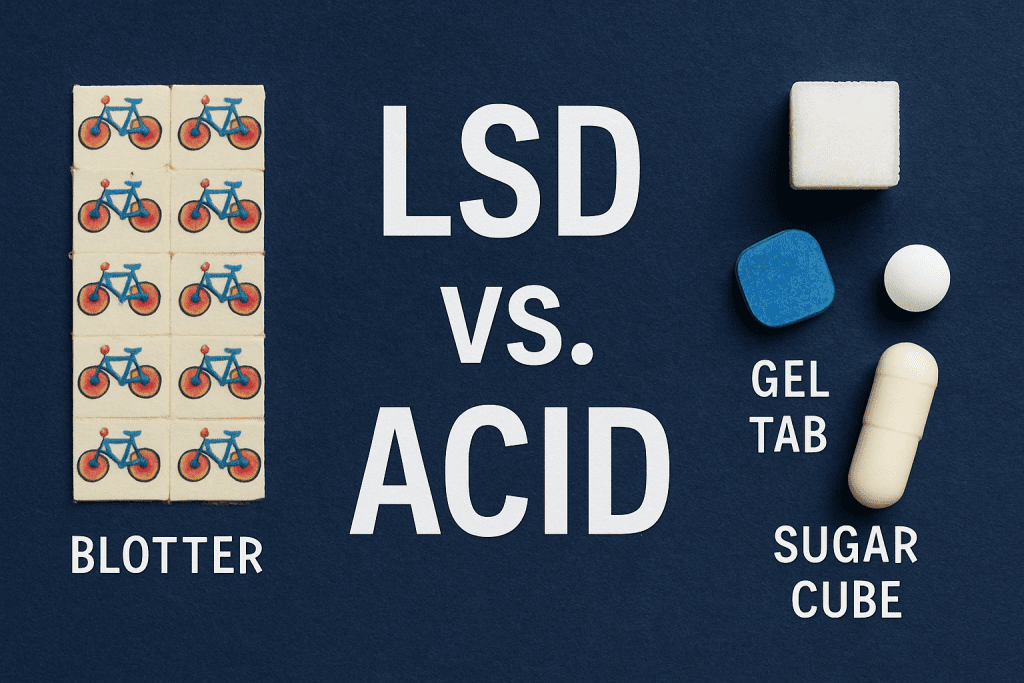Last Updated on August 27, 2025
LSD vs. Acid: Side Effects of Using Both & How to Tell if Addicted to Hallucinogens
Introduction: LSD and Acid—Are They the Same?
When discussing hallucinogens, the terms lsd vs acid are often used interchangeably. Both refer to the same substance: lysergic acid diethylamide. While “LSD” is the chemical name, “acid” is a popular street name. Other common aliases include “blotter,” “Lucy,” “dots,” “tabs,” and “gels.” Despite the different names, the effects, risks, and potential for addiction remain consistent.
What Is LSD (Acid)?
LSD is a powerful hallucinogenic drug that alters perception, mood, and various cognitive processes. It is a synthetic compound, meaning it is not naturally occurring and is chemically produced in laboratories. The substance is typically odorless, colorless, and tasteless, often found in the form of a white crystalline powder.
Common Forms of LSD
LSD is commonly consumed in several forms:
-
Blotter Paper: Small squares of paper soaked in LSD solution, perforated for easy division.
-
Gel Tabs: Gelatin squares infused with LSD, often more potent than blotter paper.
-
Liquid LSD: LSD dissolved in alcohol or water, which can be ingested directly or applied to other substances.
-
Sugar Cubes: Sugar cubes soaked in LSD solution, consumed by eating.
These forms are designed for oral consumption, allowing the drug to be absorbed through the mucous membranes in the mouth.
Side Effects of Using LSD (Acid)
Short-Term Effects
The effects of LSD can vary widely depending on the dose, the user’s mental state, and the environment. Common short-term effects include:
-
Visual Hallucinations: Altered perceptions of colors, shapes, and movement.
-
Auditory Distortions: Changes in the perception of sounds, such as hearing music differently.
-
Altered Sense of Time: Time may seem to slow down or speed up.
-
Euphoria or Anxiety: Intense feelings of happiness or, conversely, panic and fear.
-
Synesthesia: The blending of senses, such as “seeing” sounds or “hearing” colors.
Long-Term Effects
While LSD is not considered physically addictive, long-term or frequent use can lead to:
-
Hallucinogen Persisting Perception Disorder (HPPD): Persistent visual disturbances similar to flashbacks.
-
Psychological Dependence: A compulsion to use the drug to achieve desired mental states.
-
Mental Health Issues: Exacerbation of underlying mental health conditions, such as depression or schizophrenia.
Signs of Addiction to LSD (Acid)
Although LSD is not physically addictive, users can develop a psychological dependence. Signs of potential addiction include:
-
Frequent Use: Using LSD regularly or in increasing amounts.
-
Cravings: Strong desire or urge to use LSD.
-
Neglecting Responsibilities: Prioritizing LSD use over work, school, or personal obligations.
-
Continued Use Despite Negative Consequences: Using LSD even when it leads to harmful effects on relationships or health.
-
Tolerance: Needing larger doses to achieve the same effects.
Treatment Options for LSD Addiction
Addressing psychological dependence on LSD often requires professional intervention. Treatment options include:
-
Cognitive Behavioral Therapy (CBT): Helps individuals recognize and change harmful thought patterns and behaviors.
-
Group Therapy: Provides support and shared experiences among individuals facing similar challenges.
-
Family Therapy: Involves family members in the treatment process to improve communication and support.
-
Mindfulness and Stress Reduction Techniques: Helps individuals manage anxiety and cravings.
In some cases, medications may be prescribed to address underlying mental health conditions contributing to the use of LSD.
Conclusion on lsd vs acid
Understanding that LSD and acid are the same substance is crucial in recognizing the potential risks associated with their use. While the drug can induce profound experiences, it also carries significant risks, especially with frequent or high-dose use. If you or someone you know is struggling with LSD use, seeking professional help is an important step toward recovery.
For more information on treatment options and support, consider reaching out to local health services or addiction specialists.
Remember, early intervention can lead to better outcomes and a healthier future.
